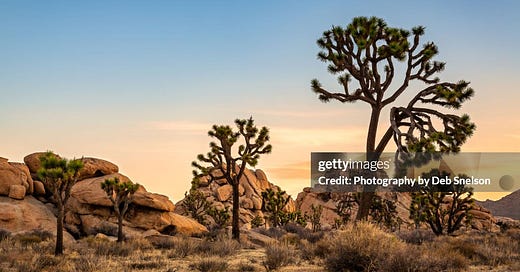Again this week, I am sharing a memory from my own childhood instead of a story from elementary school children. Here is a salient memory of 13-year-old Marsha.
After the 6th grade my family moved from Hawaii to 29 Palms, California. In Hawaii, I lived in the Aiea Hills, overlooking Pearl Harbor. I played in guava groves, harvested bananas from my back yard and made leis out of the plumerias blooming in my front yard. We left a lush tropical paradise to live on a military base in the Mojave Desert. I had to leave my first true friend, and I was lonely. The desert was drab and barren and I longed for trees and flowers. I thought the natural world around me was as lonely and despondent as I was.
Sometime in my 7th grade, the 29 Palms Baptist Church youth group took a hike to the 49 Palms Oasis in Joshua Tree National Monument. We walked on a trail through the desert, and I was amazed when we suddenly found ourselves among palm trees and flowers. Hummingbirds dive-bombed my hat, and I had not heard such a chorus of birds since I left Hawaii. I felt more homesick than ever.
As we were walking out of the oasis and back along the desert trail, I looked around, and for the first time, the desert around me was breathtakingly beautiful. I could hardly believe that I had earlier considered this landscape to be ugly. It was exquisite.
For weeks afterwards I thought about how I had seen the desert as ugly when it was in fact so beautiful. I came to an understanding, astonishing to me, that the desert was neither ugly nor beautiful. The beauty was in me – in my way of looking at the desert. Maybe I had never heard the proverb ‘Beauty is in the eye of the beholder’ because, at age 13, I honestly thought I was the originator of this idea. I started experimenting with this, and I came to believe that virtually anything was beautiful if I were able to look at it as a thing of beauty. I established a practice of ‘finding the beauty’ in whatever I experienced. I took this seriously (as I was inclined to do – perhaps I was a strange child.) I worked at learning to see beauty.
I was in college, in a Shakespeare class, studying Love’s Labor’s Lost (or maybe another of the comedies – my memory is shaky here) when I fully understood that I was not the originator of the idea that beauty is not absolute and does not exist in the external world, but in the perceiver. I remember being downright giddy when I realized this, and I remember wanting to tell someone how exciting this was and realizing that others would find my excitement foolish or incomprehensible.
I am in my seventies as I write this, and I have lost almost all of my central vision, which means I cannot see faces. The message that goes from my retinae to my cerebral cortex provides only a blur when I look at faces. My cerebral cortex is far too clever, however, to leave me with a blur for all faces. I construct a face for all the people I know and all the faces I construct are beautiful. There are no blemishes, no asymmetries, no unpleasing proportions. All the faces my brain creates for me are beautiful. I have sometimes wondered whether I set myself up for this happy state of affairs when, at age thirteen, I established a beauty practice.
I would love to learn about memories you have of childhood revelations, or puzzlements. Do you remember when you first worried about good and evil? When you were first exhilarated by beauty? When you first disagreed with your parents about something important? If you share these memories, I will share similar or contrasting thoughts expressed by elementary school children from Memphis, Orlando, and Shenzhen, China.





Thanks for your very interesting comment, Barb. I am curious about how many children are more like you were and how many are more like I was. I love listening to children because I love to hear their puzzlement. It takes a little time to convince some of them that I really want to know what they are thinking about, and it is true that they do not all share ideas with me. Still, I usually assume that they are wondering and trying to make sense out of the world around them, even if they don’t choose to let me in on it. I must recognize, however, that some children (maybe many?) do not approach the world this way. Your description of a childhood of pure experiential reactions may characterize most children, or most children most of the time. Your memory of an unquestioning acceptance of what each day offers may be a quality of childhood that many of us try to recover when life presents us with experience that defies our best sense-making skills. This just means that we have as much to learn from the children who do not talk to me as from those who do!
Hmmmmm. I'm thinking.